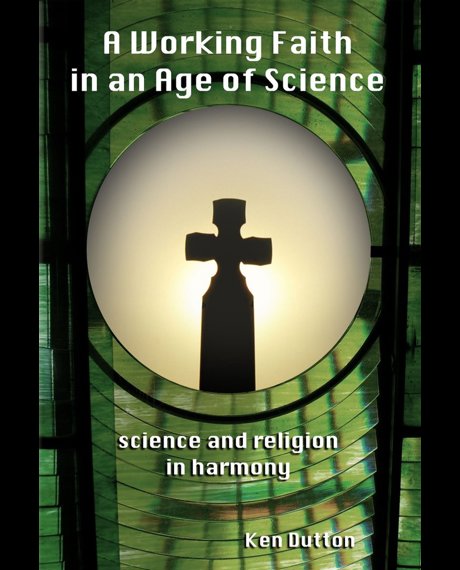A Working Faith In An Age Of Science: Science And Religion In Harmony
A Working Faith In An Age Of Science: Science And Religion In Harmony
€ 2,62
If you suspect that religion is just outdated superstition, left over from a less sophisticated age, you may well wonder how it is that many well-educated scientists can also have an active religious faith. On the other hand, if you have a genuine religious faith, but are not particularly well informed about science, then you might view the world of science and technology as a threatening place in which to try to justify (or even admit to) your faith,
This book is intended for anyone described above. The author has been both a professional scientist and an active Christian for about 40 years, and his book equally defends both good science and faith in God.
The book is aimed at any interested reader from late teenage onwards. Specialist terminology from both science and theology is avoided where possible, and explained where it cannot be avoided. The book's introduction includes a list of 21 interesting questions which are addressed in the book, some of which are questions which have arisen more than once in question-and-answer sessions following talks given by the author.
The science in this book is written in a “popular science” style, and there is more of it than in most books on this topic. There is sufficient science to indicate how scientists go about their work, how much science has achieved, and how reliable its results might be. One reason for that is to encourage religious people to realize that good science cannot simply be dismissed without good reason. Another reason is to highlight some of science’s limitations.
The religious aspects of the book include an indication of what religious people really believe (as opposed to the stereotypes propagated by some atheistic writers), and how such beliefs can actually assist scientists in understanding more aspects of the way the universe seems to be.
Some of the areas visited are:
•Achievements and limitations of science
•Creation
•Evidence for God’s existence
•Evolution
•Free will
•How God might act in the world
•Miracles
•Prayer
•Suffering
The author is a highly qualified professional engineer, and thus very much an applied scientist. He has also been an active Christian for 40 years. Every project he has worked on, during 10 years of research and development in industry, and whilst acting as a consultant during 30 years as a university lecturer, has had to work in the real world. His faith has to do that too, and the pragmatic approach of the professional engineer is evident throughout the book.
If you suspect that religion is just outdated superstition, left over from a less sophisticated age, you may well wonder how it is that many well-educated scientists can also have an active religious faith. On the other hand, if you have a genuine religious faith, but are not particularly well informed about science, then you might view the world of science and technology as a threatening place in which to try to justify (or even admit to) your faith,
This book is intended for anyone described above. The author has been both a professional scientist and an active Christian for about 40 years, and his book equally defends both good science and faith in God.
The book is aimed at any interested reader from late teenage onwards. Specialist terminology from both science and theology is avoided where possible, and explained where it cannot be avoided. The book's introduction includes a list of 21 interesting questions which are addressed in the book, some of which are questions which have arisen more than once in question-and-answer sessions following talks given by the author.
The science in this book is written in a “popular science” style, and there is more of it than in most books on this topic. There is sufficient science to indicate how scientists go about their work, how much science has achieved, and how reliable its results might be. One reason for that is to encourage religious people to realize that good science cannot simply be dismissed without good reason. Another reason is to highlight some of science’s limitations.
The religious aspects of the book include an indication of what religious people really believe (as opposed to the stereotypes propagated by some atheistic writers), and how such beliefs can actually assist scientists in understanding more aspects of the way the universe seems to be.
Some of the areas visited are:
•Achievements and limitations of science
•Creation
•Evidence for God’s existence
•Evolution
•Free will
•How God might act in the world
•Miracles
•Prayer
•Suffering
The author is a highly qualified professional engineer, and thus very much an applied scientist. He has also been an active Christian for 40 years. Every project he has worked on, during 10 years of research and development in industry, and whilst acting as a consultant during 30 years as a university lecturer, has had to work in the real world. His faith has to do that too, and the pragmatic approach of the professional engineer is evident throughout the book.
| Prijs | Verzendkosten | Totaal | |
|---|---|---|---|
€ 2,62 | € 0,00 | € 2,62 |
Alternatieve producten
© 2016 - 2024 aanbiedingchecker


/backgroundcolor(255,255,255)/jpg(90)/fetch/https://media.s-bol.com/Y2vYK9yN2Zn/804x1200.jpg)
/backgroundcolor(255,255,255)/jpg(90)/fetch/https://media.s-bol.com/NQRjkVgWYY6/756x1200.jpg)
/backgroundcolor(255,255,255)/jpg(90)/fetch/https://media.s-bol.com/j7Q957JWnAv/756x1200.jpg)
/backgroundcolor(255,255,255)/jpg(90)/fetch/https://media.s-bol.com/mlkB0NVkgJE/798x1200.jpg)